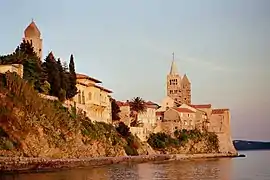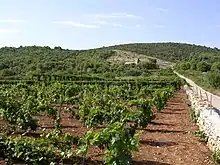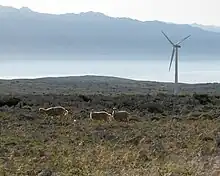List of inhabited islands of Croatia
In the Croatian part of the Adriatic Sea, there are 718 islands, 389 islets and 78 reefs,[1] making the Croatian archipelago the largest in the Adriatic Sea and the second largest in the Mediterranean Sea, after the Greek archipelago.[2]
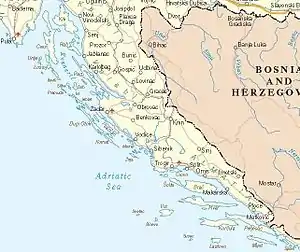
Of the 718 islands, only 47 are inhabited in the sense that at least one person resides on that island.[3] Some sources indicate that Croatia has 67 inhabited islands,[4] counting those that have a settlement,[1] but 20 of those have lost all of their permanent population as a result of the population decline occurring throughout the Croatian islands due to insufficient economic activity.[5]
The Adriatic islands have been populated at least since the time of Ancient Greece. For example, Hvar was already populated between 3500 BC and 2500 BC[6] and Dionysius I of Syracuse founded a colony on Hvar and Vis in the 4th century BC.[7] The combined island population reached its peak in 1921, at 173,503 inhabitants, and went into steady decline in the following decades, dropping to pre-1850s level by 1981.[4] The depopulation trend was reversed only in the 1990s, with the 2001 census registering a population of 122,418, up from 110,953 in 1991.[1]
The main industries on the islands are agriculture, fishing and tourism. The islands' agriculture is primarily devoted to viticulture and olive growing. The local economy is relatively underdeveloped while the cost of living is 10 to 30% higher than on the mainland,[4] so the Croatian government provides various kinds of support and protection through its Islands Act (Croatian: Zakon o otocima) to stimulate the economy of the islands, including charging no tolls on bridges, and providing discounted or free ferry tickets for islanders.[8]
Islands
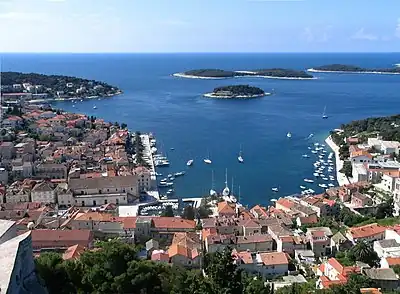
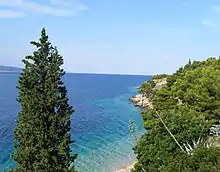
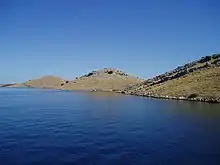
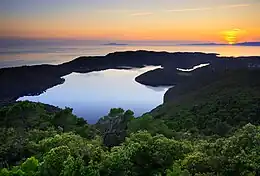
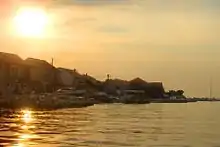
| 0 to 10/km2 (0.000 to 0.040/acre) | |
| 10 to 50/km2 (0.040 to 0.202/acre) | |
| 50 to 100/km2 (0.20 to 0.40/acre) | |
| 100 to 150/km2 (0.40 to 0.61/acre) | |
| >150/km2 (0.61/acre) |
| #[note 1] | Island | County | Population[3] (as of 31 Mar 2011) |
Area[3] | Highest point[3] | Population density |
|---|---|---|---|---|---|---|
| 1 | Krk | Primorje-Gorski Kotar | 19,383 | 405.78 km2 (100,270 acres) | 568 m (1,864 ft) | 47.8/km2 (0.193/acre) |
| 2 | Korčula | Dubrovnik-Neretva | 15,522 | 276.03 km2 (68,210 acres) | 569 m (1,867 ft) | 56.2/km2 (0.227/acre) |
| 3 | Brač | Split-Dalmatia | 13,956 | 394.57 km2 (97,500 acres) | 780 m (2,560 ft) | 35.4/km2 (0.143/acre) |
| 4 | Hvar | Split-Dalmatia | 11,077 | 299.66 km2 (74,050 acres) | 628 m (2,060 ft) | 37.0/km2 (0.150/acre) |
| 5 | Rab | Primorje-Gorski Kotar | 9,328 | 90.84 km2 (22,450 acres) | 410 m (1,350 ft) | 102.7/km2 (0.416/acre) |
| 6 | Pag | Lika-Senj and Zadar | 9,059 | 284.56 km2 (70,320 acres) | 349 m (1,145 ft) | 31.9/km2 (0.129/acre) |
| 7 | Lošinj | Primorje-Gorski Kotar | 7,587 | 74.68 km2 (18,450 acres) | 589 m (1,932 ft) | 101.6/km2 (0.411/acre) |
| 8 | Ugljan | Zadar | 6,049 | 50.21 km2 (12,410 acres) | 286 m (938 ft) | 120.5/km2 (0.488/acre) |
| 9 | Čiovo | Split-Dalmatia | 5,908 | 28.80 km2 (7,120 acres) | 217 m (712 ft) | 205.1/km2 (0.830/acre) |
| 10 | Murter | Šibenik-Knin | 4,895 | 18.60 km2 (4,600 acres) | 125 m (410 ft) | 263.2/km2 (1.065/acre) |
| 11 | Vis | Split-Dalmatia | 3,445 | 90.26 km2 (22,300 acres) | 587 m (1,926 ft) | 38.2/km2 (0.155/acre) |
| 12 | Cres | Primorje-Gorski Kotar | 3,079 | 405.78 km2 (100,270 acres) | 639 m (2,096 ft) | 7.6/km2 (0.031/acre) |
| 13 | Vir | Zadar | 3,000 | 22.38 km2 (5,530 acres) | 112 m (367 ft) | 134.0/km2 (0.542/acre) |
| 14 | Pašman | Zadar | 2,845 | 63.34 km2 (15,650 acres) | 272 m (892 ft) | 44.9/km2 (0.182/acre) |
| 15 | Šolta | Split-Dalmatia | 1,700 | 58.98 km2 (14,570 acres) | 236 m (774 ft) | 28.8/km2 (0.117/acre) |
| 16 | Dugi Otok | Zadar | 1,655 | 114.44 km2 (28,280 acres) | 337 m (1,106 ft) | 14.5/km2 (0.059/acre) |
| 17 | Mljet | Dubrovnik-Neretva | 1,088 | 100.41 km2 (24,810 acres) | 513 m (1,683 ft) | 10.8/km2 (0.044/acre) |
| 18 | Lastovo | Dubrovnik-Neretva | 792 | 46.87 km2 (11,580 acres) | 415 m (1,362 ft) | 16.9/km2 (0.068/acre) |
| 19 | Iž | Zadar | 615 | 17.59 km2 (4,350 acres) | 168 m (551 ft) | 35.0/km2 (0.142/acre) |
| 20 | Šipan | Dubrovnik-Neretva | 419 | 15.81 km2 (3,910 acres) | 224 m (735 ft) | 26.5/km2 (0.107/acre) |
| 21 | Prvić | Šibenik-Knin | 403 | 2.37 km2 (590 acres) | 75 m (246 ft) | 170.0/km2 (0.688/acre) |
| 22 | Silba | Zadar | 292 | 14.98 km2 (3,700 acres) | 83 m (272 ft) | 19.5/km2 (0.079/acre) |
| 23 | Zlarin | Šibenik-Knin | 284 | 8.19 km2 (2,020 acres) | 169 m (554 ft) | 34.7/km2 (0.140/acre) |
| 24 | Vrgada | Zadar | 249 | 3.7 km2 (910 acres)[9] | 115 m (377 ft)[9] | 67.3/km2 (0.272/acre) |
| 25 | Lopud | Dubrovnik-Neretva | 249 | 4.63 km2 (1,140 acres)[10] | 216 m (709 ft)[10] | 53.8/km2 (0.218/acre) |
| 26 | Molat | Zadar | 197 | 22.82 km2 (5,640 acres) | 148 m (486 ft) | 8.6/km2 (0.035/acre) |
| 27 | Kaprije | Šibenik-Knin | 189 | 6.97 km2 (1,720 acres) | 132 m (433 ft) | 27.1/km2 (0.110/acre) |
| 28 | Ist | Zadar | 182 | 9.7 km2 (2,400 acres)[11] | 174 m (571 ft)[11] | 18.8/km2 (0.076/acre) |
| 29 | Krapanj | Šibenik-Knin | 170 | 0.36 km2 (89 acres)[12] | 1.5 m (4.9 ft)[12] | 472.2/km2 (1.911/acre) |
| 30 | Koločep | Dubrovnik-Neretva | 163 | 2.4 km2 (590 acres)[13] | 125 m (410 ft)[13] | 67.9/km2 (0.275/acre) |
| 31 | Susak | Primorje-Gorski Kotar | 151 | 3.8 km2 (940 acres)[14] | 98 m (322 ft)[14] | 39.7/km2 (0.161/acre) |
| 32 | Drvenik Veli | Split-Dalmatia | 150 | 12.07 km2 (2,980 acres) | 178 m (584 ft) | 10.8/km2 (0.044/acre) |
| 33 | Olib | Zadar | 140 | 26.09 km2 (6,450 acres) | 74 m (243 ft) | 5.4/km2 (0.022/acre) |
| 34 | Rava | Zadar | 117 | 3.6 km2 (890 acres)[15] | 98 m (322 ft)[15] | 32.5/km2 (0.132/acre) |
| 35 | Žirje | Šibenik-Knin | 103 | 15.06 km2 (3,720 acres) | 134 m (440 ft) | 6.8/km2 (0.028/acre) |
| 36 | Unije | Primorje-Gorski Kotar | 88 | 16.92 km2 (4,180 acres) | 132 m (433 ft) | 5.2/km2 (0.021/acre) |
| 37 | Drvenik Mali | Split-Dalmatia | 87 | 3.3 km2 (820 acres)[16] | 79 m (259 ft)[16] | 26.4/km2 (0.107/acre) |
| 38 | Ilovik | Primorje-Gorski Kotar | 85 | 5.2 km2 (1,300 acres)[17] | 92 m (302 ft)[17] | 16.3/km2 (0.066/acre) |
| 39 | Premuda | Zadar | 64 | 9.25 km2 (2,290 acres) | 88 m (289 ft) | 6.9/km2 (0.028/acre) |
| 40 | Sestrunj | Zadar | 48 | 15.03 km2 (3,710 acres) | 185 m (607 ft) | 3.2/km2 (0.013/acre) |
| 41 | Zverinac | Zadar | 43 | 4.2 km2 (1,000 acres)[18] | 111 m (364 ft)[18] | 10.2/km2 (0.041/acre) |
| 42 | Rivanj | Zadar | 31 | 4.4 km2 (1,100 acres)[19] | 112 m (367 ft)[19] | 7.0/km2 (0.028/acre) |
| 43 | Ošljak | Zadar | 29 | 0.3 km2 (74 acres)[20] | 90 m (300 ft)[20] | 96.7/km2 (0.391/acre) |
| 44 | Kornat | Šibenik-Knin | 19 | 32.30 km2 (7,980 acres) | 237 m (778 ft) | 0.6/km2 (0.0024/acre) |
| 45 | Biševo | Split-Dalmatia | 15 | 5.8 km2 (1,400 acres)[21] | 239 m (784 ft)[21] | 2.6/km2 (0.011/acre) |
| 46 | Vele Srakane | Primorje-Gorski Kotar | 3 | 1.15 km2 (280 acres)[22] | 59 m (194 ft)[22] | 2.6/km2 (0.011/acre) |
| 47 | Male Srakane | Primorje-Gorski Kotar | 2 | 0.61 km2 (150 acres)[23] | 40 m (130 ft)[24] | 3.3/km2 (0.013/acre) |
Notes
- The numbers in the first column of the table indicate each island's rank according to total population.
References
- Croatian Bureau of Statistics (2009). "Geographical and meteorological data" (PDF). Statistical Yearbook for 2009. Croatian Bureau of Statistics. p. 44. Archived (PDF) from the original on 2017-01-03. Retrieved 2011-10-09.
- Faričić, Josip (23 February 2006). "Hrvatski pseudo-otoci". geografija.hr (in Croatian). Archived from the original on 10 July 2012. Retrieved 2009-02-26.
- Ostroški, Ljiljana, ed. (December 2015). Statistički ljetopis Republike Hrvatske 2015 [Statistical Yearbook of the Republic of Croatia 2015] (PDF). Statistical Yearbook of the Republic of Croatia (in Croatian and English). Vol. 47. Zagreb: Croatian Bureau of Statistics. p. 47. ISSN 1333-3305. Retrieved 27 December 2015.
- Ministry of Development and Reconstruction (February 1997). "National island development programme" (PDF). Ministry of the Sea, Transport and Infrastructure. Archived from the original (PDF) on 2011-08-07. Retrieved 2011-06-29.
- Treglav, Bojan (1 September 2006). "Za otoke milijardu kuna godišnje!" (PDF). Vjesnik (in Croatian). pp. 2–3. Archived from the original (PDF) on 20 March 2009. Retrieved 2006-10-02.
- "Povijest Hvara". hvar.hr (in Croatian). City of Hvar. Archived from the original on 2016-10-28. Retrieved 2016-10-27.
- Hazel, John (2000). Who's who in the Greek world. Routledge. p. 86. ISBN 0-415-12497-2.
- "The Islands Act (Refined Text)" (PDF). Ministry of the Sea, Transport and Infrastructure. 8 March 2006. Archived from the original (PDF) on 7 August 2011. Retrieved 2009-03-20.
- "Vrgada" (in Croatian). peljar.cvs.hr. Archived from the original on 2016-03-03. Retrieved 2006-10-02.
- "Otok Lopud, Dubrovnik" (in Croatian). Archived from the original on 2016-03-03. Retrieved 2006-10-02.
- "Ist" (in Croatian). peljar.cvs.hr. Archived from the original on 2016-03-08. Retrieved 2006-10-02.
- "The Brodarica - Krapanj Tourist Board". Archived from the original on 2006-09-08. Retrieved 2006-10-02.
- "Koločep" (in Croatian). peljar.cvs.hr. Archived from the original on 2016-03-03. Retrieved 2006-10-02.
- "Susak" (in Croatian). peljar.cvs.hr. Archived from the original on 2016-03-03. Retrieved 2006-10-02.
- "Rava" (in Croatian). peljar.cvs.hr. Archived from the original on 2016-03-03. Retrieved 2006-10-02.
- "Drvenik Mali" (in Croatian). peljar.cvs.hr. Archived from the original on 2016-03-04. Retrieved 2006-10-02.
- "Ilovik" (in Croatian). peljar.cvs.hr. Archived from the original on 2016-03-04. Retrieved 2006-10-02.
- "Zverinac" (in Croatian). peljar.cvs.hr. Archived from the original on 2016-03-03. Retrieved 2006-10-02.
- "Rivanj" (in Croatian). peljar.cvs.hr. Archived from the original on 2016-03-07. Retrieved 2006-10-02.
- "Ošljak" (in Croatian). peljar.cvs.hr. Archived from the original on 2012-03-30. Retrieved 2011-10-09.
- "Biševo" (in Croatian). peljar.cvs.hr. Archived from the original on 2016-03-04. Retrieved 2006-10-02.
- "Vele Srakane" (in Croatian). peljar.cvs.hr. Archived from the original on 2016-03-04. Retrieved 2006-10-02.
- Duplančić Leder, Tea; Ujević, Tin; Čala, Mendi (June 2004). "Coastline lengths and areas of islands in the Croatian part of the Adriatic Sea determined from the topographic maps at the scale of 1 : 25 000" (PDF). Geoadria. Zadar. 9 (1): 5–32. doi:10.15291/geoadria.127. Archived from the original on 2020-03-10. Retrieved 2019-11-19.
- "Cave Srakane". DCS Lošinj. Archived from the original on 2011-07-21. Retrieved 2010-02-10.
